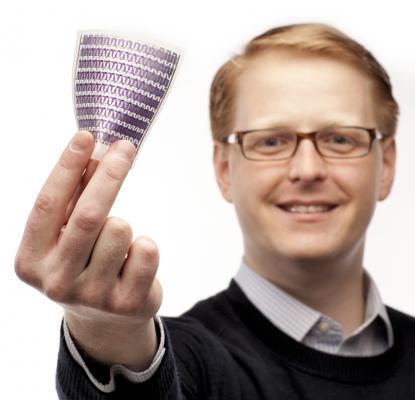Miles Barr
When the local news asked Miles Barr about his interest in science at age nine, he responded with, “It’s not really my favorite subject.” The truth was Barr did not have one preferred subject matter, but many. With a multitude of interests and a fervor for creating things, Barr became enthralled with the idea of taking apart an object to put it back together in a new way, creating something improved. Barr’s early childhood “inventions” included a robotic walking monkey using a wind shield wiper motor from an abandoned school bus and a hovercraft built from a vacuum cleaner and a porch table.
Barr’s inventiveness matured as he completed majors in chemical engineering, mathematics and music as an undergraduate at Vanderbilt University. He exercised his talents as a leader of diverse organizations outside the classroom, including the Cavaliers Drum and Bugle Corps, Phi Mu Alpha Sinfonia national music fraternity, and Tau Beta Pi national engineering honor society. Leveraging knowledge from a variety of subject areas to evolve an idea into something greater is still at the core of Barr’s approach to invention today.
Miles Barr recently received his PhD from the Department of Chemical Engineering at the Massachusetts Institute of Technology (MIT). While at MIT, Barr pioneered an approach to fabricating solar cells on a variety of everyday surfaces. The breakthrough is enabled by a portfolio of innovations spanning alternative energy, chemistry, electrical engineering, and industrial design. For his solar innovations and ability to inspire, Barr has been awarded the 2012 $30,000 Lemelson-MIT Student Prize.
Barr’s unique fabrication process allows solar cells to be created directly on nearly any surface, including tissue paper, newsprint, copy paper, and SaranTM wrap. In collaboration with MIT Professors Karen Gleason and Vladimir Bulović, Barr has explored how these solar cells, which harvest light and convert it to electricity, can be integrated into products that we interact with every day, such as wall paper, window shades, and clothing. Barr’s solar innovations have been demonstrated to world leaders including President Obama’s Director of the White House Office of Science and Technology Policy, John Holdren, and the President of Italy.
Barr benefited from numerous mentors throughout his life, and now works to contribute as an educator and leader. He has mentored undergraduate and graduate researchers in his lab, and has served as the head teaching assistant for the chemical engineering projects laboratory where he led 40 undergraduates in semester-long technical projects sponsored by industrial partners at MIT. Barr works to instill in his mentees the importance of maintaining an overarching vision while appreciating the incremental steps necessary to transform innovative ideas into reality.
Barr co-founded Ubiquitous Energy, Inc. in 2011, a technology start-up developing a portfolio of emerging solar technologies. Barr and the team at Ubiquitous Energy are exploring new ways to deploy solar energy harvesting capabilities in the form of products and surfaces we interact with every day. Ubiquitous Energy won the 2011 MIT Clean Energy Prize Renewables Category and also received the 2011 Fraunhofer-Techbridge U-Launch Award, a U.S. Department of Energy-funded award program that provides services to promising clean energy start-ups.


